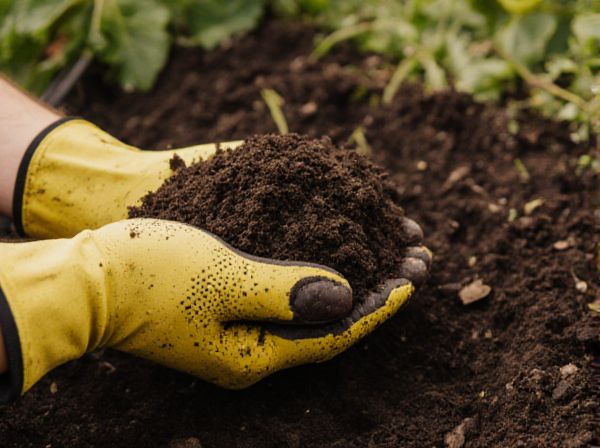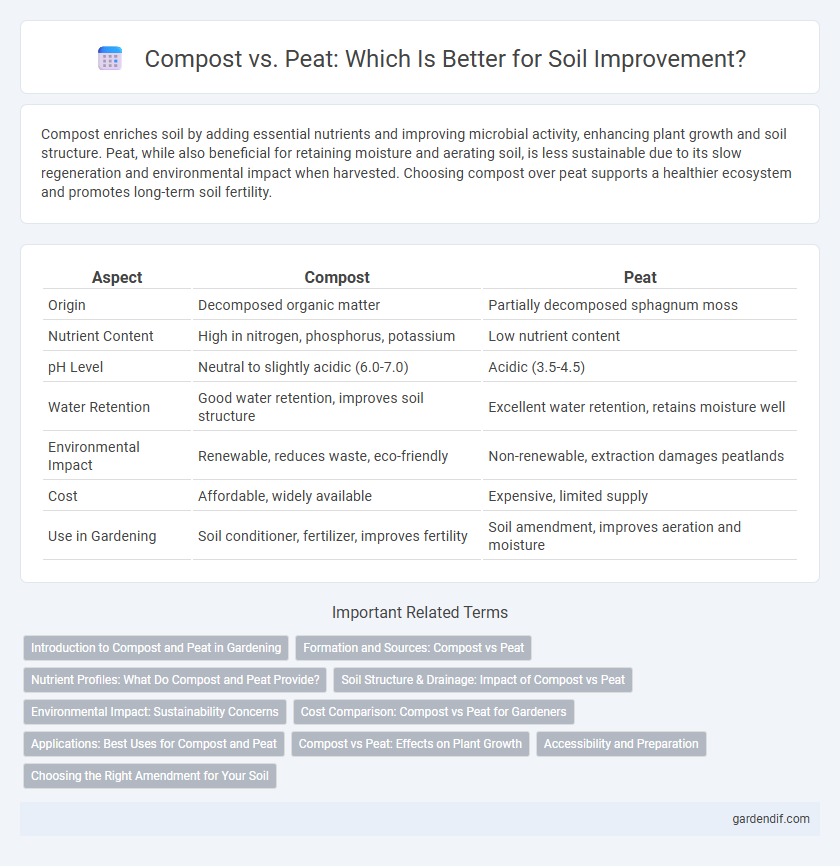
Compost vs Peat Illustration
Compost enriches soil by adding essential nutrients and improving microbial activity, enhancing plant growth and soil structure. Peat, while also beneficial for retaining moisture and aerating soil, is less sustainable due to its slow regeneration and environmental impact when harvested. Choosing compost over peat supports a healthier ecosystem and promotes long-term soil fertility.
Table of Comparison
| Aspect | Compost | Peat |
|---|---|---|
| Origin | Decomposed organic matter | Partially decomposed sphagnum moss |
| Nutrient Content | High in nitrogen, phosphorus, potassium | Low nutrient content |
| pH Level | Neutral to slightly acidic (6.0-7.0) | Acidic (3.5-4.5) |
| Water Retention | Good water retention, improves soil structure | Excellent water retention, retains moisture well |
| Environmental Impact | Renewable, reduces waste, eco-friendly | Non-renewable, extraction damages peatlands |
| Cost | Affordable, widely available | Expensive, limited supply |
| Use in Gardening | Soil conditioner, fertilizer, improves fertility | Soil amendment, improves aeration and moisture |
Introduction to Compost and Peat in Gardening
Compost is an organic soil amendment rich in nutrients formed through the decomposition of plant and food waste, enhancing soil structure and microbial activity. Peat, derived from partially decayed sphagnum moss in wetlands, provides excellent moisture retention and acidity regulation but is less nutrient-dense than compost. Gardeners often choose compost for nutrient supplementation and soil health, while peat is favored for improving soil aeration and water retention in acidic soil conditions.
Formation and Sources: Compost vs Peat
Compost forms through the aerobic decomposition of organic waste materials such as food scraps, yard trimmings, and manure, resulting in nutrient-rich humus beneficial for soil health. Peat originates from the accumulation of partially decayed plant material in waterlogged, anaerobic environments like bogs and wetlands over thousands of years, creating a dense, carbon-rich substrate. While compost is a renewable resource produced through controlled microbial activity, peat extraction is a slow geological process that depletes natural ecosystems and releases stored carbon.
Nutrient Profiles: What Do Compost and Peat Provide?
Compost offers a rich nutrient profile including nitrogen, phosphorus, potassium, and micronutrients essential for plant growth, enhancing soil fertility and microbial activity. Peat provides excellent water retention and acidity regulation but contains minimal nutrients, often requiring supplementation for plant nutrition. Understanding these differences is crucial for selecting the right soil amendment based on specific gardening or agricultural needs.
Soil Structure & Drainage: Impact of Compost vs Peat
Compost improves soil structure by increasing organic matter content, enhancing aggregation, and promoting better aeration and water retention. Peat, while also organic, tends to hold water excessively and can lead to poor drainage, especially in clay soils. Using compost instead of peat results in more balanced moisture levels and improved soil porosity, fostering healthier root development and reducing waterlogging risks.
Environmental Impact: Sustainability Concerns
Compost is a sustainable soil amendment that enhances soil health by recycling organic waste and reducing landfill use, promoting carbon sequestration and biodiversity. In contrast, peat harvesting damages fragile ecosystems, releases stored carbon dioxide, and depletes non-renewable resources due to its slow regeneration rate. Choosing compost over peat supports environmental conservation and aligns with sustainable agriculture practices aimed at minimizing ecological footprint.
Cost Comparison: Compost vs Peat for Gardeners
Compost generally costs less than peat due to its widespread availability and ability to be produced from organic waste locally. Peat, harvested from peat bogs, involves higher extraction and transportation expenses resulting in a more expensive price point for gardeners. Choosing compost not only reduces gardening costs but also supports sustainable soil health by recycling organic materials.
Applications: Best Uses for Compost and Peat
Compost is ideal for enriching garden soil, enhancing nutrient content, and promoting healthy plant growth due to its high organic matter and microbial activity. Peat excels in improving soil structure, moisture retention, and acidity control, making it suitable for acid-loving plants and seed starting. Choosing compost supports sustainable gardening by recycling organic waste, while peat use requires careful consideration due to its environmental impact on peatland ecosystems.
Compost vs Peat: Effects on Plant Growth
Compost enriches soil with essential nutrients and beneficial microorganisms that enhance plant growth by improving soil structure and water retention. Peat primarily acts as a soil conditioner, increasing acidity and moisture retention but lacks significant nutrient content, which may limit plant development. Studies show that plants grown in compost-amended soils exhibit higher biomass and more robust root systems compared to those grown with peat.
Accessibility and Preparation
Compost offers greater accessibility due to its widespread availability from organic waste sources and minimal processing requirements, making it a cost-effective soil amendment for gardeners and farmers. Peat, sourced from specific peat bogs, involves more extensive extraction and preparation, limiting its availability and increasing environmental concerns. The preparation of compost typically involves aerobic decomposition, which can be performed on-site, whereas peat requires harvesting and drying, making compost more convenient for immediate soil enrichment.
Choosing the Right Amendment for Your Soil
Compost enriches soil with organic matter, improves nutrient content, and enhances microbial activity, making it ideal for most garden soils. Peat, derived from decomposed sphagnum moss, is excellent for acid-loving plants but has a high environmental impact due to slow regeneration. Selecting the right amendment depends on soil pH, nutrient needs, and sustainability considerations for better plant growth and soil health.
Compost vs Peat Infographic

 gardendif.com
gardendif.com